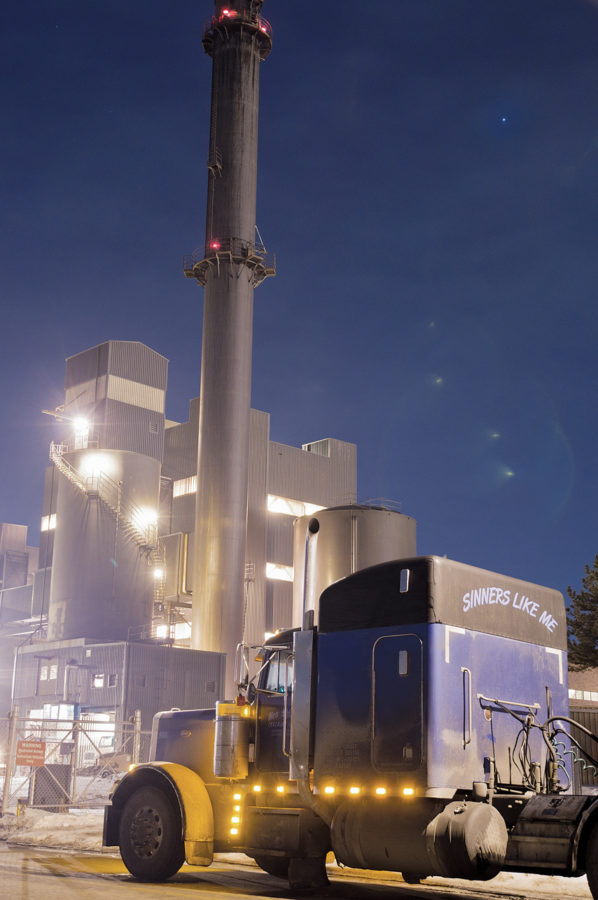New mercury emissions report released
Photo: Logan Gaedke/Iowa State Daily
A load of coal from Muscatine is delivered to the ISU Power Plant. Groups want to highlight the dangers of coal and encourage students to call for Iowa State to reduce its usage of coal.
January 26, 2011
Environment Iowa came out with a new report, discussed during a news conference, Wednesday at the state capitol in Des Moines.
“Dirty Energy’s Assault on our Health: Mercury” stresses the adverse effects of mercury emissions; a neurotoxin primarily emitted from burning coal.
Mercury is a heavy metal, found in coal and other forms of biomass. When burnt, coal emits the mercury in higher concentrations which results in harmful consequences for humans’ health and the environment.
“Mercury is a dangerous neurotoxin that harms growing children and pollutes our environment,” said Jessica Buchberger, field associate for Environmental Iowa. “In people, mercury exposure can result in learning disabilities, developmental disorders and lower IQs.”
The pollutant not only causes people harm neurologically, it also poses a threat to women of childbearing age.
“Mercury can pass through pregnant women and get into the baby and cause all kinds of prenatal birth defects,” said Neila Seaman, director of the Sierra Club Iowa Chapter. “It affects men with cardiovascular problems and in some cases infertility.”
Mercury pollution is so widespread that the EPA estimates that 1 in 6 women of childbearing age has enough mercury in her bloodstream to put her unborn child at risk, should she become pregnant, Buchberger said.
Aside from harming human health, mercury pollution has caused significant harm to fish populations, wildlife diversity and agriculture.
“In fish and animals that consume fish, mercury pollution in waterways causes reproductive failure and increased mortality,” Buchberger said.
Some of the environmental effects include, increased mortality in wildlife populations and decreased fertility, which is contributing to a loss of biodiversity. Mercury also gets into our agriculture, which gets into our food, Buchberger said.
Environment Iowa has found the power plants in Iowa emit more mercury than power plants in 33 other states, producing a total of 2,735 pounds of mercury, from data collected between 2010 and 2011.
“Coal is dirty from beginning to end, from the mining, to the burning, to the disposal of it and everything in between that’s causing us problems,” said Graham Jordison, Iowa Coal Organizer of the Sierra Student Coalition and former ISU student. “It’s polluting our air, it’s polluting our water, it’s affecting the way the economy’s not growing, it’s preventing us from having a real clean energy economy.”
Other countries around the world have realized these problems and admitted to them, something that Jordison would like to see happen at a local level.
“We’ve got people in Iowa at certain campuses that will not even admit the health environmental effects, you don’t hear them talking about the effects, like you hear some of these leaders, these people who are taking responsibility,” Jordison said. “While they’re doing [and] saying these things, we’re just continuing business as usual, continuing the status quo because it’s cheap.”
Because of the overwhelming health concerns, the Environmental Protection Agency has taken initiative to set a standard for limiting mercury and other toxic emissions from power plants this March.
In Iowa, Buchberger speculates the mercury emissions to decrease by 90 percent after the EPA limits are enforced.
Iowa State’s power plant burns coal to produce the university’s electricity; however, the plant currently does not take into account how much mercury is being emitted.
“I don’t believe we actually report that number in our emissions inventory at this time yet,” said Jeff Witt, assistant director of utilities. “The boiler MACT rules are going to be regulating mercury and we will be working to comply with those rules and be reporting whatever the rules require us to report there.”
With this standard taking place in March, the EPA may be urging power plants to reduce mercury emissions. Environment Iowa, Sierra Club and Physicians for Social Responsibility urge for Iowans to engage themselves as well.
“I think students need to stay actively involved. Students can attend events, hold rallies, but they need to be involved in that. Students need to pressure their legislatures, their university administrators and the EPA, and spread the word to get other people involved,” Seaman said.
“Continuing to be heard on the issue is important, continuing to raise the issue so people understand what’s at stake,” said Mary Beth Gardam, member of Iowa Physicians for Social Responsibility. “Young people get this, they’re really in a position to bring along the rest of us and showing leadership is important, but while young people get it, they’re pulled in so many directions right now that it’s hard to get them to focus on it.”
As a former ISU student, Jordison urges students to take the initiative to combat this issue.
“You need to take a big risk, you need to get your feet wet, and you[‘ve] got to go and learn the issues and you[‘ve] got to be a part of something much bigger than what you’re already a part of,” Jordison said. “We have a voice, we should have a voice. The students pay to go to school [at Iowa State], it’s their environment, it’s their life, it’s their future and it’s being affected by the power plant.”







